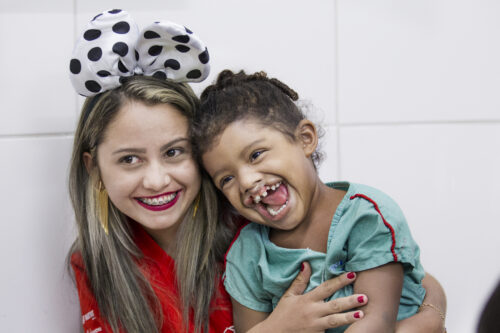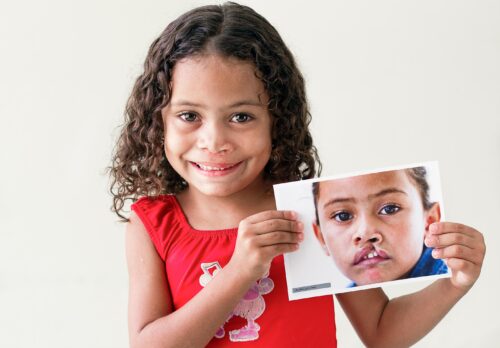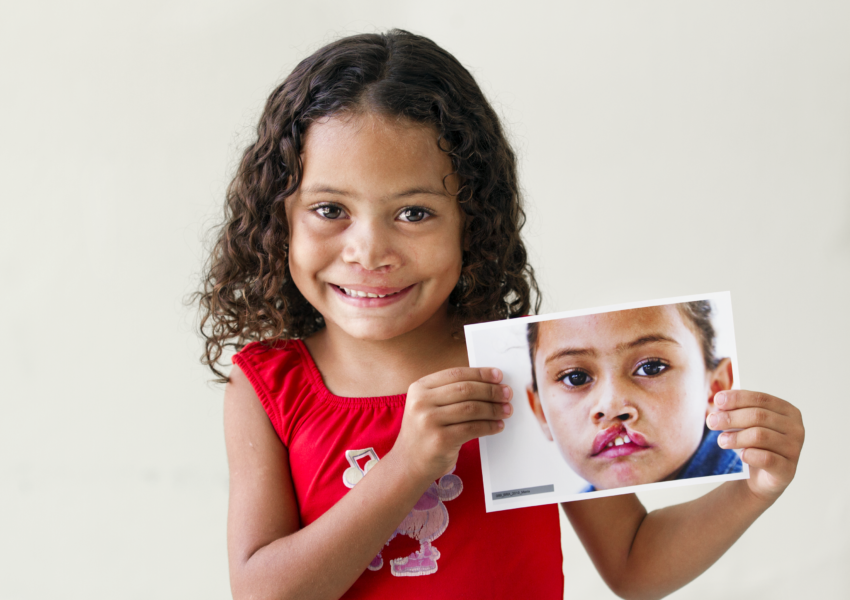
Operation Smile Brazil has delivered surgery to 6,080 patients as well as quality health services for children born with cleft conditions.
THE NEED
Backlog of 340,000 patients. In Brazil, it is estimated that there is a backlog of 340,000 patients living with untreated cleft conditions.
Health care access limited despite spending. Brazil has one of the lowest proportions of public spending on health (46%) in Latin America and the Caribbean (average 51%), in upper-middle-income countries (55%) and in Organization for Economic Cooperation and Development countries (62%). Limited government spending on health in Brazil results in inadequate funding for essential medical services, including cleft surgery.
Financial burden. Despite making significant progress towards achieving Universal Health Coverage. Brazil continues to face shortages in public funding and challenges in health care delivery. Out-of-pocket expenses often prevent families from accessing the treatment that they need. As a result, 13% of the population is at risk of impoverishing expenditure for surgical care, while 15% faces catastrophic expenditure in case of surgical care.
Unequal access to care. Unequal access to health care in Brazil puts children living with cleft conditions at an even greater risk. With one doctor per 1,000 individuals, the North Region has the lowest number of medical providers. Brazilians living in the North Region also face the greatest disparity between availability of doctors in large and medium cities (2.5/1,000) compared to rural areas (0.4/1,000).
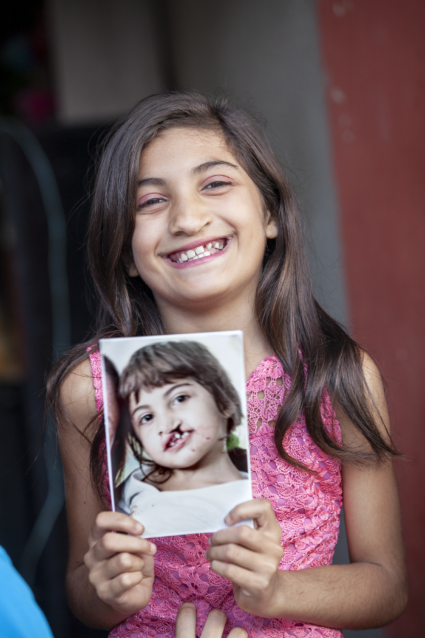
OUR FORMULA FOR TRANSFORMATION
Operation Smile’s formula for transformational impact combines care delivery and capacity-building.
Education programs are at the center of Operation Smile’s strategy to increase access to surgery closer to the patient’s home.
Each surgical program brings together providers from all over the world for a unique opportunity to share knowledge and innovate. This type of bi-directional learning is essential to redistributing knowledge between providers and building capacity in the areas of greatest need.
Our work in health infrastructure addresses structural barriers to care and helps build robust health systems. Operation Smile’s research & innovation efforts inform all aspects of our decision-making and allow us to have a comprehensive understanding of the impact our programs have on patients.
HUBS & SPOKES
To ensure that every child has access to care close to home, we equip the providers within our patients’ communities with skills and resources to deliver high quality care. We build the needed capacity by harnessing the talent and resources that exist within the country, usually in the bigger cities (the hubs) to train providers in under-resourced areas (the spokes) where most patients lack access to care.
In Brazil, the hub in Rio de Janeiro serves as an educational center, providing top-quality training for surgeons, online learning opportunities for medical providers across various specialties and scholarships for local coordinators of cleft centers so they can be trained in multidisciplinary care delivery.
The spokes are located in Santarém, Porto Velho and Natal.
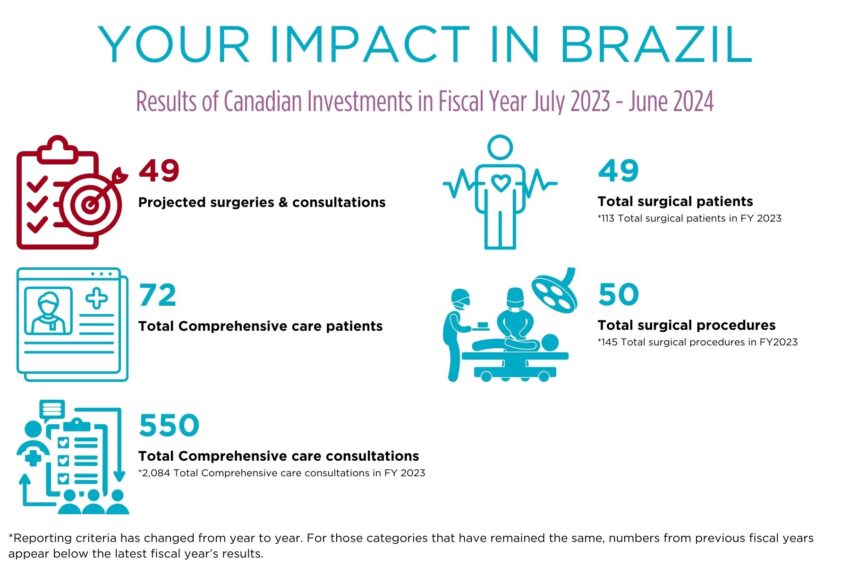
During Fiscal Year July 2024-June 2025, Operation Smile will invest $490,300 to provide surgery for 390 patients and train 230 health workers across different specialties.
Cleft Care Programs
This year, Operation Smile Brazil will provide surgical care for around 390 patients. Operation Smile will expand comprehensive care services, ensuring that patients have access to high-quality multidisciplinary services before and after cleft surgery. We will deliver consultations in oral health (320 patients), speech therapy (approx. 310 patients), nutrition (240 patients), psychosocial care (240 patients), pediatrics (240 patients) and ENT care (approx. 310 patients). We will recruit new patients with the help of local organizations and through social media and local radio campaigns.
Education Program
Operation Smile will provide training and education opportunities for nearly 230 medical providers. We will deliver training during surgical programs and work together with the Craniofacial Anomalies Treatment center to provide training for surgeons and local coordinators of Cleft Centers. Operation Smile will offer training across surgical and non-surgical specialties. We will coordinate American Heart Association courses for providers working in various medical fields.
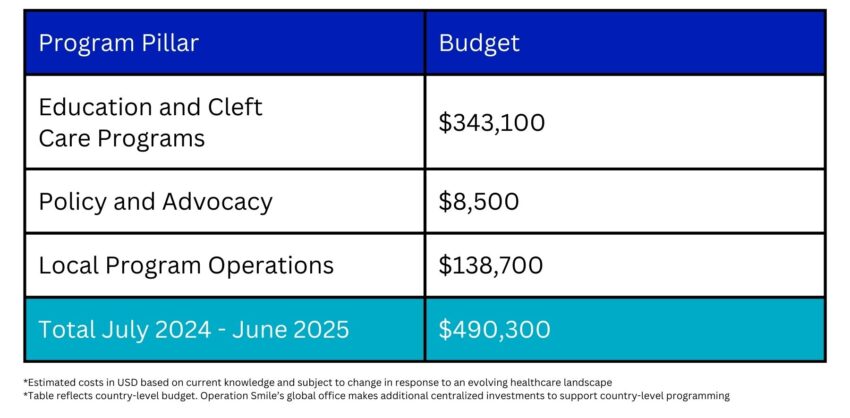
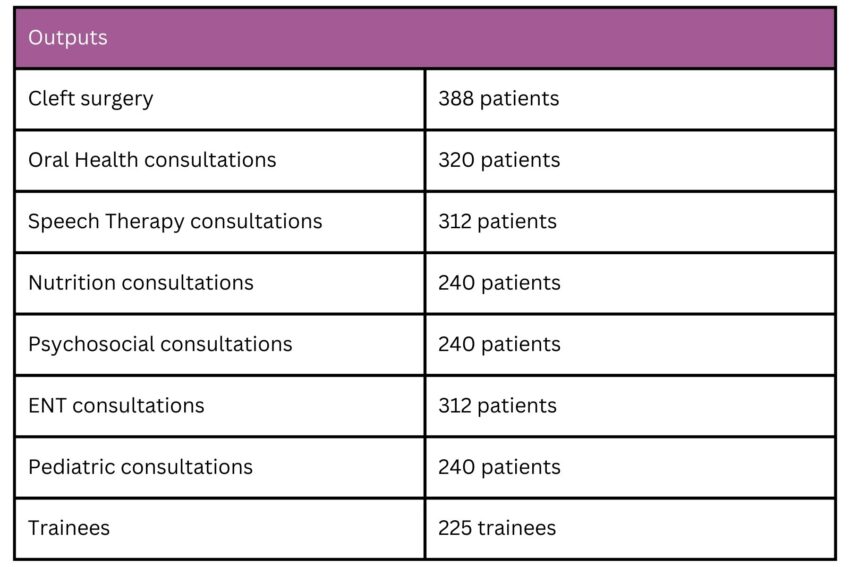
FIVE-YEAR VISION
Over the next five years, Operation Smile Brazil will provide surgeries for 2,275 patients and deliver consultations for approximately 8,925 patients.
We will increase access to cleft surgery and comprehensive care for patients living in the north and northeast of the country by expanding our direct patient care programs and providing education and training opportunities for medical professionals.
We will partner with universities in Porto Velho, Saratém and Cariri to provide education in dentistry, speech therapy, nursing, pediatrics, nutrition and psychology. We will develop a teaching hub in Rio de Janeiro.
We will support cleft research among Brazilian health professionals, enhancing the quality of cleft care in the country.




